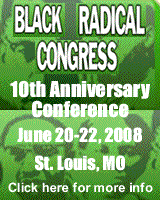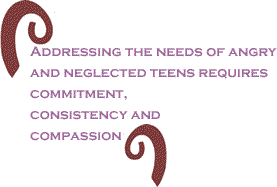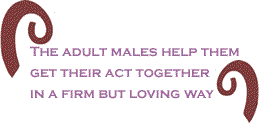
|
||||||||||||||||||||||
 |
||||||||||||||||||||||
 |
||||||||||||||||||||||
 |
||||||||||||||||||||||
 |
||||||||||||||||||||||
 |
||||||||||||||||||||||
 |
||||||||||||||||||||||
 |
| The current issue is always free to everyone |
|
|
 |
As I put the finishing touches on this commentary, four black men have been murdered in my city in a 24-hour period. It is tragic trend that other urban cities are also facing. Recently,
What I do know is that addressing the needs of angry and neglected teens requires commitment, consistency and compassion. It’s got to be less of telling these young men what to do and a whole lot of showing them. Most importantly, it cannot be a passing fad. The appeals for more meaningful black male involvement in family and community affairs, such as last week’s Call to Oneness, have the potential to have a similar effect on young males as the male elephants have on wayward, adolescent calves. The elephant herd reminds me of the current African
American family structure. Elephants are fascinating animals.
They are very intelligent with a highly socialized environment.
They are also a matriarchal society. The clan is made up of
females and their offspring along with the grown daughters and
their calves. There comes a time in every male elephant’s life
when he gets to the point that Grandma called “gettin’ too big
for your britches”. In elephant terms, this is called musth.
They get rowdy and uncontrollable; that’s when they get pushed
from the cow herd over to the bull herd to learn what it means
to be a male elephant. I saw an example of this on TV when some young,
male elephants got buck wild in South Africa’s
There are a lot of young black males who have been running loose, raising themselves with no real model of manhood. The impressive turnout of black men who responded to the Call for Oneness gave me a bounce of hope. It’s past time to hit the streets and show these misguided males some tough love. The women folk are tired of visiting the prisons, tired of going to the emergency rooms, tired of burying our young - just tired. We could use of herd of brothers in the neighborhood. Peace in the hood is starting to look more real. BlackCommentator.com Editorial
Board member, Jamala Rogers, is the leader of the Organization for Black Struggle
in |
Your comments are always welcome. e-Mail
re-print notice
If you send us an e-Mail message we may publish all or part of it, unless you tell us it is not for publication. You may also request that we withhold your name. Thank you very much for your readership. |
|
| June
12, 2008 Issue 281 |
|
| Executive Editor: Bill Fletcher, Jr. |
| Managing
Editor: |
| Publisher: Peter Gamble |
| Est. April 5, 2002 |
| Printer Friendly Version in resizeable plain text format or pdf format. |
 |
 |
 |
| |
| |























 The
Call for Oneness follows several efforts in various cities such
as Philly’s Call to Action: It's a New Day campaign; St. Pete,
FL’s Calling the Men Home Project; San Diego’s Black Men United;
and Baltimore’s Call to Action, to name a few. I don’t
know what the progress is for these campaigns and it maybe too
early to tell (Anyone from those cities can give me a brief
update).
The
Call for Oneness follows several efforts in various cities such
as Philly’s Call to Action: It's a New Day campaign; St. Pete,
FL’s Calling the Men Home Project; San Diego’s Black Men United;
and Baltimore’s Call to Action, to name a few. I don’t
know what the progress is for these campaigns and it maybe too
early to tell (Anyone from those cities can give me a brief
update).








